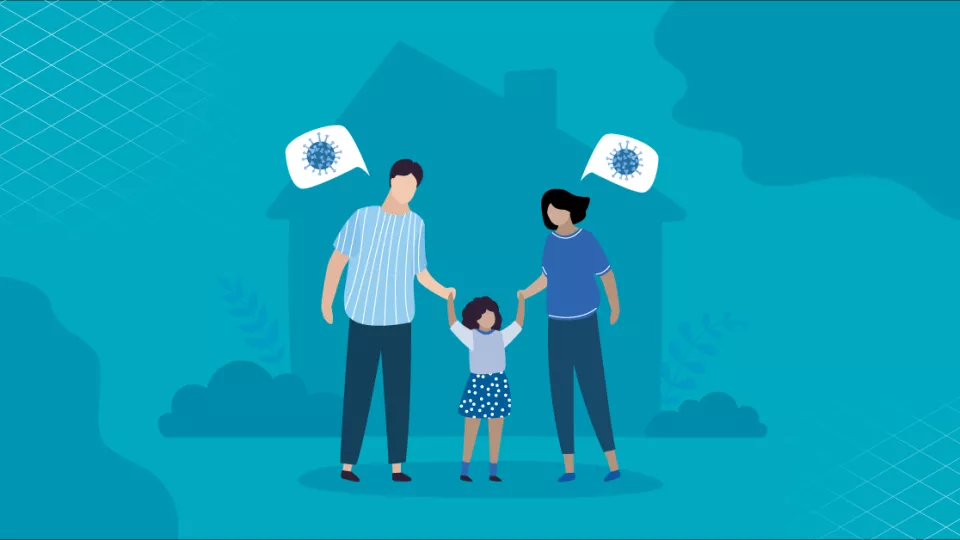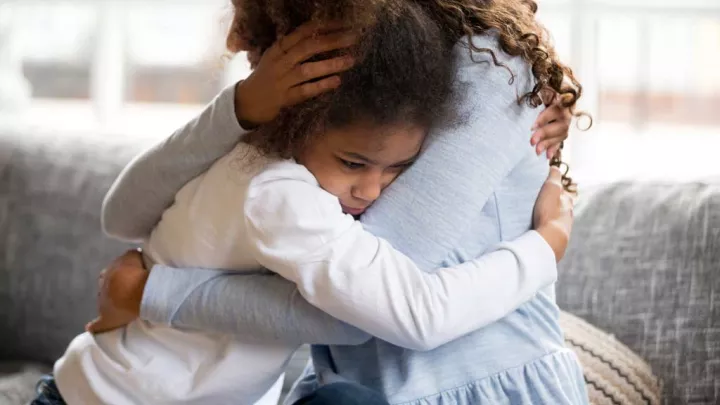
How to Talk to Kids About Coronavirus
As the novel coronavirus disease, called COVID-19, continues to spread, it’s important for adults to communicate calmly with children.
Karen Rogers, PhD, Clinical Psychologist at Children’s Hospital Los Angeles, provides some guidelines for how to talk to kids about the virus.
Kids pay close attention to how adults talk about the coronavirus

“One of the most important things to keep in mind is that children use adults to understand the world,” Dr. Rogers says. “So kids will be more or less anxious based on how the adults around them are communicating with them.”
Kids and teenagers alike need adults to help them put this situation in perspective.
“They also don’t have a lot of life experience to put something like COVID-19 in context,” says Dr. Rogers. “They really do need adults to interpret information for them.”
Dr. Rogers also reminds adults that children are often more tuned-in to what is happening than adults realize.
“Be aware that children often listen to adult conversations even when they don’t seem to be,” she says. “It’s best to talk with them directly and also to reassure them as much as possible.”
Provide accurate, age-appropriate facts about the coronavirus
Before talking to kids, adults should understand the facts and be prepared to share accurate information in a way that kids can understand.
“It’s important to let kids know that most children aren’t particularly vulnerable to COVID-19,” says Dr. Rogers. “Adults can tell kids that most children don’t get very sick from the virus. That will help them feel less anxious.”
Because COVID-19 is still so new, scientists are not sure why fewer children seem to develop symptoms of the virus, or have mild symptoms, but they are at lower risk for getting sick than older adults.
“Grown-ups can also talk to kids about ‘flattening the curve,’ meaning that we’re staying inside more to help stop germs from spreading and make sure sick people get the help they need from doctors and health care workers,” adds Dr. Rogers.
Help kids cope with anxiety caused by school closures
Staying home and not having social contact is likely to be stressful for children of all ages, so adults need to give kids some tools to cope with the situation. Keeping to a schedule (like schoolwork in the morning, outside time after lunch) can help children and adults feel like the situation is more predictable.
“As social beings, we all need social relationships,” says Dr. Rogers. “This disruption in daily life can be stressful for children, who count on consistency to help them feel safe. Young children might be especially confused by the change and wonder if their friends are still their friends, for example. Even teenagers, who spend a lot of time on their devices, are experiencing a major disruption in their social lives with school closures.”
Dr. Rogers advises adults to invite children and teens to share their feelings about being separated from their friends and help them make plans to stay in touch by virtual visits, phone calls or even writing letters.
Adults can also explain that while this disruption is difficult, it is temporary.
“Adults can tell kids that we don’t know how long it will last, but we do know that kids will go back to school, adults will go back to their work, and people will be able to gather in large groups again.”
Grown-ups can tell children that all these changes, such as school closures, are being done to help avoid spreading the virus and prevent as many people as possible from getting sick.
In order to keep reduce children’s anxiety, Dr. Rogers also advises adults to limit kids’ exposure to the news and social media. Even teens, who may be using social media to stay connected with friends, need to take a break from their devices.
“Parents need to continue to monitor children’s use of social media, provide structure and ensure that children and teens have screen-free time especially at night,” says Dr. Rogers
Talk to kids to help alleviate anxiety with coronavirus
“This is an opportunity to help kids learn that when they feel worried about things, it’s important to talk to people,” says Dr. Rogers. “You can tell a child, ‘When you feel anxious, talk to grown-ups about it because they can often help you.’”
Dr. Rogers suggests approaching a child’s worries in a curious way. “You can say, ‘What if I told you most kids aren’t getting very sick from this?’ Then you can give them information.”
Also, adults need to understand that children may respond to stress is different ways. Kids may misbehave, become more clingy, seem more giddy or hyper, be more demanding, moody or irritable.
“Kids don’t always know that their behavior has changed or why,” says Dr. Rogers. “They need adults to help them understand and express their feelings in healthy ways.”
Adults should initiate conversation with their kids and encourage them to share their thoughts and feelings. Talk about all different types of feelings a child might be having. “Some kids might feel really worried about if they will get sick. Some kids might be happy to have a vacation from school or might miss their friends,” says Dr. Rogers. “Encourage the child to share if he or she has any of those feelings—or some different ones.”
It’s also important for adults to help children identify ways to cope with their emotions. Some ideas include:
- Talking with a trusted adult
- Taking deep breaths
- Drawing pictures
- Writing a story about how they feel
“Children often use distraction as a coping strategy and this can be helpful, but adults should still help them take time to discuss their feelings about what is happening in their life,” adds Dr. Rogers.
Older children, youth and young adults may benefit from a reminder about how easy it is to get swept up in misinformation or panic through online media, and they may need help to figure out trustworthy sources of information and learn to manage their screen use.
Tell your kids that adults are working to keep them safe
The COVID-19 pandemic is a fluid situation. Adults can reassure kids that even if things change—like certain safety precautions are put in place—it’s being done to keep all of us safe.
“It’s important for kids to know that there are lots of adults working very hard to make sure this illness doesn’t make a lot of people sick,” Dr. Rogers says. “We can tell them there are really smart people working really hard on this, and schools are closed because adults made that decision in order to protect everybody.”
Demonstrate good hygiene habits
For adults, modeling good hygiene—such as frequent hand-washing—is the best way to get kids to do the same.
“Adults can let kids know, ‘I am going to wash my hands and I’m going to sing the alphabet song,’” says Dr. Rogers. “Or adults can say, ‘Oops, I touched my nose. I’m going to wash my hands.’”
It’s also important to be consistent and remind kids to wash their hands with warm, soapy water after playing outside or before meals, and to try to avoid touching their eyes, noses and mouths.
“Those routines are lifetime health habits that kids will carry with them,” Dr. Rogers says.
If a child comes to CHLA for care, remind the child that the doctors and nurses know what to do.
“Parents and staff can tell kids that all of the staff at Children’s Hospital Los Angeles have had training to deal with something like this and know how to take care of kids,” says Dr. Rogers. “Our staff members have lots of experience in taking care of people. We can tell kids we have a plan in place, and we know what to do.”
Take care of yourself, too
“Adults need to take care of themselves during this stressful time as well,” advises Dr. Rogers. “Some adults may have specific worries for themselves or their families. It’s important for them to pay attention to their own emotional well-being, too, which will allow them to better support their children.”


